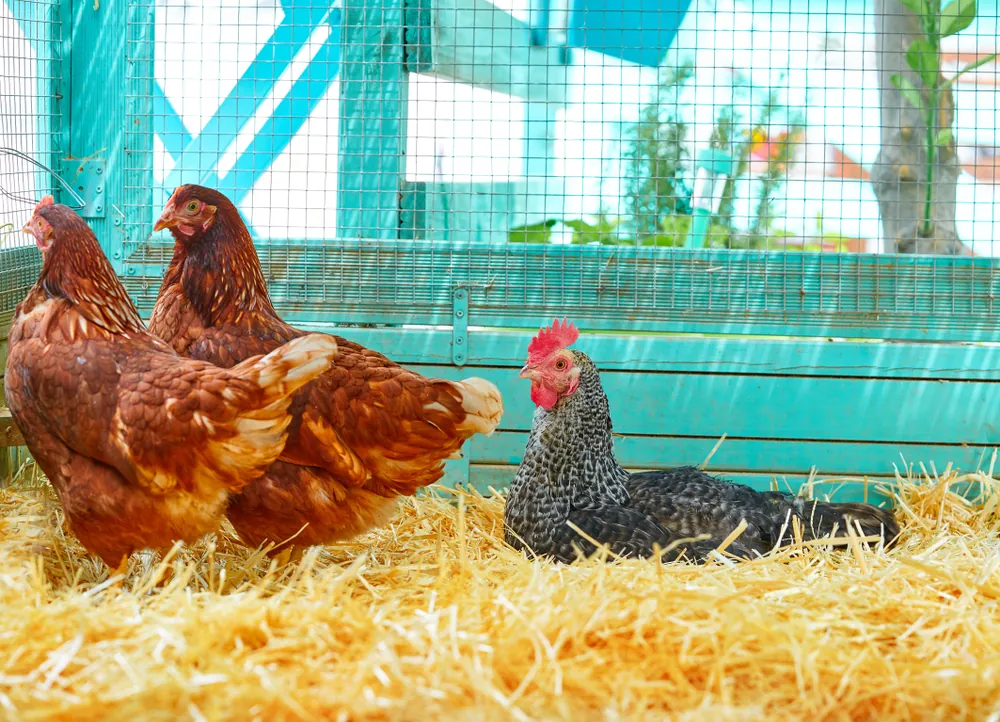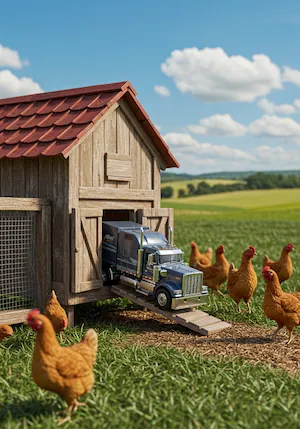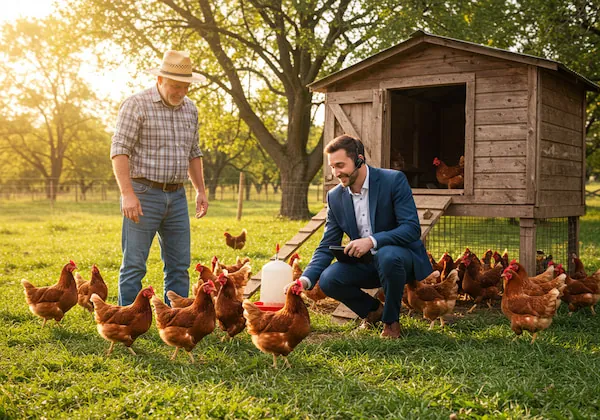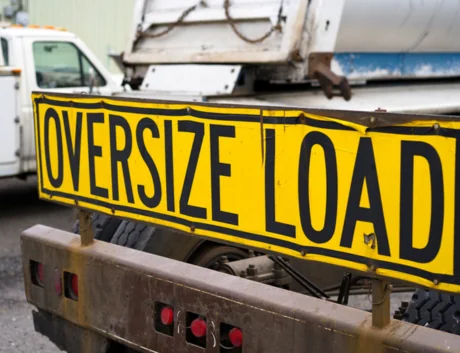
Shipping Chicken Coops
Ready for Eggcelent Shipping Service?
Create your own backyard paradise with our chicken coop shipping service! From cozy cottages to modern havens, we deliver the perfect home for your feathered friends. Explore our hassle-free shipping solutions and start your urban farming adventure today!
Need to Ship a Chicken Coop? FreightCenter Makes It Easy
Whether you’re a backyard chicken enthusiast, a farm supply retailer, or a chicken coop manufacturer, transporting a coop—especially a pre-built one—can be a logistical challenge. With bulky dimensions, delicate framing, and sometimes specialized materials, chicken coops require expert freight handling to arrive safely and affordably.
Thousands of businesses trust FreightCenter to move their freight faster, smarter, and cheaper! From unbeatable rates to top-notch service, our customers are raving about their shipping success.
See why they keep coming back!
Award-Winning Service, Trusted by Shippers Everywhere!
- 2021, 2017 & 2016 Food Logistics’ Top Green Providers
- 2021 & 2018 Supply & Demand Chain Executives’ Pros to Know: Matthew Brosious
- 2020 & 2019 Top Food Logistics’ 3PL & Cold Storage Provider Award
- 2020 & 2019 Business Observer’s Top 500 Companies on the Gulf Coast
- 2020 & 2017 SmartWay® Transport Partner
- 2020 & 2017 Food Logistics’ Champions: Rock Stars of the Supply Chain
- 2020 Best of Palm Harbor Awards for Local Businesses
- 2017 Green Supply Chain Award from Supply & Demand Chain Executive
- 2017 Tampa Bay Business Journal Heroes at Work
- 2016, 2015, & 2012 Food Logistics Top 100 Software and Technology Providers
- 2013 Tampa Bay Business 100 by Tampa Bay Business Journal
- 2013 Top 100 Great Supply Chain Partners by SupplyChainBrain
- 2012 TIA Samaritan Award Honorable Mention
- 2012, 2011 & 2010 TBBJ Fast 50 Recipient
- 2013, 2011, & 2010 Diversity Business Top Businesses

Why Choose FreightCenter for Shipping Chicken Coops?
At FreightCenter, we don’t just quote shipments—we provide reliable, hands-on support from start to finish. Chicken coops come in all shapes and sizes, and we understand the specific challenges of transporting:
-
Assembled coops
-
Coop kits or flat-pack units
-
Prebuilt coops on skids or pallets
-
Oversized or custom-built designs
Coop shippers trust FreightCenter because we offer tailored solutions for every shipment—from LTL and FTL options to carriers matched by size, material, and delivery needs.
With real-time quote comparisons, expert packaging guidance, residential services, and end-to-end freight support, we make shipping chicken coops simple and stress-free.
Chicken Coop Shipping Requirements: Documents, Regulations & Safety
When shipping chicken coops—especially with live chickens—it’s essential to have the proper freight documentation and follow key regulations. Required documents may include a bill of lading, commercial invoice, packing list, insurance paperwork, permits, and health certificates for live animals. Shippers must also comply with Live Animal Transport Regulations, which govern cage size, temperature control, ventilation, and nourishment for the chickens.
At FreightCenter, we simplify this process by offering comprehensive documentation services and matching you with carriers experienced in transporting fragile, oversized shipments like chicken coops. We work with trusted freight partners to ensure your shipment is compliant, secure, and delivered safely.
(Disclaimer: FreightCenter does not ship live chickens (yet); we just thought this information was vital for you to know)
Freight Prep Checklist for Chicken Coop Sellers
If you’re a coop builder, Etsy seller, farm supplier, or manufacturer shipping coops to customers, prep is everything. Proper packaging not only protects your product—it saves you money and prevents carrier rejections or damage claims.
Use this FreightCenter-approved checklist before you ship:
1. Get Accurate Dimensions
Measure the length, width, and height of the packaged coop. Include any skid or pallet base in your measurement.
2. Weigh Your Shipment
Use a certified scale or check with your freight prep partner for an accurate weight (including packaging). This affects freight class and quote accuracy.
3. Disassemble When Possible
Flat-packed or partially disassembled coops are cheaper and safer to ship. Secure all hardware in a clearly labeled, sealed bag.
4. Use a Solid Base
Always place the coop on a pallet or skid. If shipping pre-assembled, use reinforced blocking to protect the frame.
5. Wrap and Protect
Use foam padding on corners, shrink wrap for water resistance, and straps to secure the structure. Label fragile areas as needed.
6. Label Clearly
Apply labels that have the destination address and contact info on them.
Need help choosing freight class codes or determining NMFC classifications? FreightCenter’s team is ready to assist.
To create value for our customers by delivering customized shipping solutions that meet their unique needs and to fulfill shipping demands from simple to complex with expertise, guidance and ingenuity.
If you’re shipping individual chicken coops or small batches, LTL (Less-Than-Truckload) freight shipping is a budget-friendly solution. This method allows your shipment to share truck space with other freight, reducing costs while ensuring safe transport. Ideal for farm supply retailers, backyard poultry enthusiasts, or small businesses, LTL shipping is perfect for transporting disassembled coops, prefab kits, or lightweight coop accessories. FreightCenter partners with a trusted network of LTL carriers to provide efficient, secure delivery while keeping your freight costs low.
For larger chicken coop shipments, such as bulk orders for agricultural suppliers, manufacturers, or large-scale poultry operations, FTL (Full Truckload) shipping is the best choice. With FTL, your entire shipment rides on a dedicated truck, minimizing handling and reducing the risk of damage to heavy or pre-assembled structures. This method is ideal for multiple coops, custom-built designs, or complete product lines. FreightCenter offers customized truckload solutions, ensuring your chicken coops are secure, properly handled, and delivered directly to their destination—on time and in excellent condition.
Need your chicken coop delivered fast? Whether you're preparing for a poultry expo, restocking inventory before peak season, or managing an urgent order, FreightCenter’s expedited shipping services ensure fast, reliable delivery. With priority handling, real-time tracking, and accelerated transit times, our expedited freight options are perfect for time-sensitive shipments, including assembled coops, kits, or accessories. We'll help you meet your deadlines without compromising the safety of your shipment.
Shipping custom-built, high-value, or fragile chicken coops requires extra care and protection. FreightCenter offers specialized freight shipping services, including white-glove delivery, climate-controlled transport, and enhanced security options. Whether you're shipping designer coops, collectible builds, or delicate display models to a farm, fair, or retail location, our custom freight solutions include minimal handling and optional insurance coverage to keep your shipment safe every step of the way.


FreightCenter is Here for All Your Chicken Coop Needs!
FreightCenter understands the importance of delivering your coops safely and on time. With over 25 years in the logistics industry, we are dedicated to providing the best shipping experience while keeping your costs low. We partner with over 50 carriers nationwide, allowing us to offer discounted rates that you won’t find anywhere else. Our tailored solutions include expedited shipping, white-glove services, and specialized freight options, ensuring that your deliveries arrive in perfect condition.
Ready to ship your chicken gear? Our expert agents are here to help you find the best shipping solution for your needs. Get a free freight quote using our online tool, or call us at (800) 716-7608 today!
Frequently Asked Questions about Shipping Chicken Coops

Q. What’s the best way to ship a chicken coop?
The best method depends on the coop’s size and quantity. For single or smaller coops, LTL (Less-Than-Truckload) freight is ideal. For larger or bulk shipments, FTL (Full Truckload) shipping is the most efficient and secure option.
Q. Can I ship a fully assembled chicken coop?
Yes, but fully assembled coops often require flatbed shipping due to their size and shape. Disassembling the coop when possible is often more cost-effective and easier to transport.
Q. How much does it cost to ship a chicken coop?
Shipping costs depend on dimensions, weight, distance, shipping method, and accessorial services (like liftgate or residential delivery). FreightCenter can provide custom quotes based on your specific shipment.
Q. How should I package a chicken coop for shipping?
Q. What documents are needed to ship a chicken coop?
Essential freight documents include the bill of lading, commercial invoice, packing list, and insurance forms. If live chickens are involved, you’ll also need health certificates and animal transport permits.
Q. Can I include live chickens in the shipment?
Yes, but it requires special arrangements. Carriers must meet Live Animal Transport Regulations, including temperature control, ventilation, and proper enclosures to protect the birds during transit. (Disclaimer: FreightCenter does not ship live chickens)
Q. What’s the typical delivery time for a chicken coop shipment?
Delivery times vary based on distance and shipping method. Standard LTL may take 3–7 business days, while expedited options are available for faster delivery.
Q. Do I need insurance when shipping a chicken coop?
It’s highly recommended, especially for custom-built or high-value coops. Freight insurance protects your shipment in case of damage, loss, or delays.
Q. Are there restrictions on where chicken coops can be delivered?
Some rural or residential areas may have limited access, requiring special delivery arrangements. Be sure to check for liftgate needs, narrow roads, or delivery time restrictions.
Q. Why should I choose FreightCenter to ship my chicken coop?
With 25+ years of logistics experience and a vast network of trusted freight carriers, FreightCenter offers competitive rates, tailored shipping solutions, and personalized support to ensure your chicken coop shipment arrives safely, affordably, and on time.
Secure Chicken Coop Shipping

Chicken Coops Are Often Considered Oversized Freight
Due to their large dimensions—especially when pre-assembled—chicken coops are often classified as oversized freight, requiring special handling, equipment, or even flatbed trailers. This makes freight shipping services the most reliable and efficient method for transporting coops safely.

Disassembly Can Save You Time and Money
Shipping a disassembled coop kit is typically more cost-effective than sending a fully assembled one. Disassembled coops can be palletized and boxed, reducing dimensional weight and avoiding the need for oversized load permits or special equipment.

Weather-Proofing Is Key for Safe Transit
Since chicken coops are often made of wood or lightweight metal, they can be vulnerable to weather-related damage during shipping. Protective wrapping, water-resistant packaging, and climate-conscious carriers help keep coops safe from rain, wind, or extreme temperatures en route.


